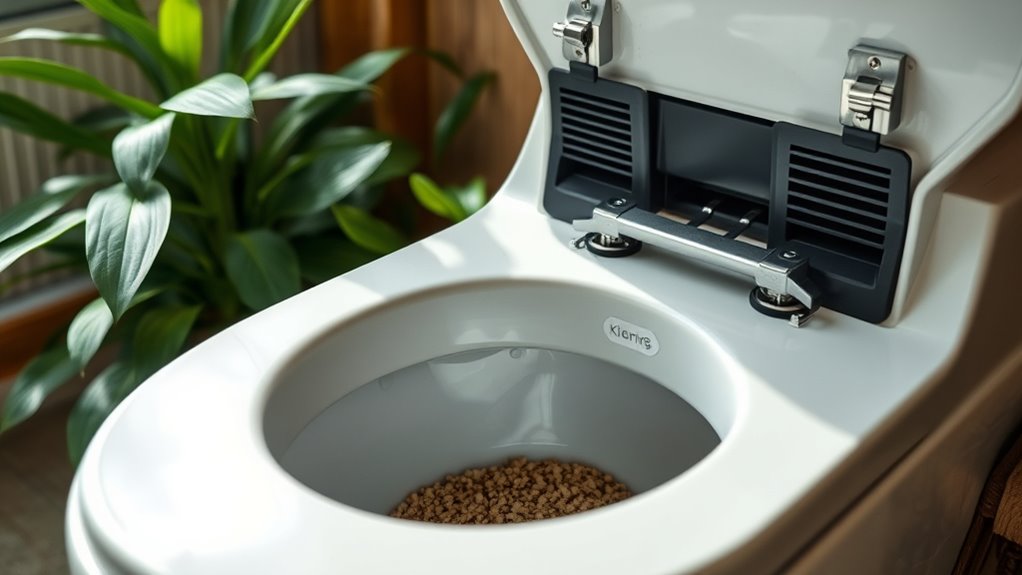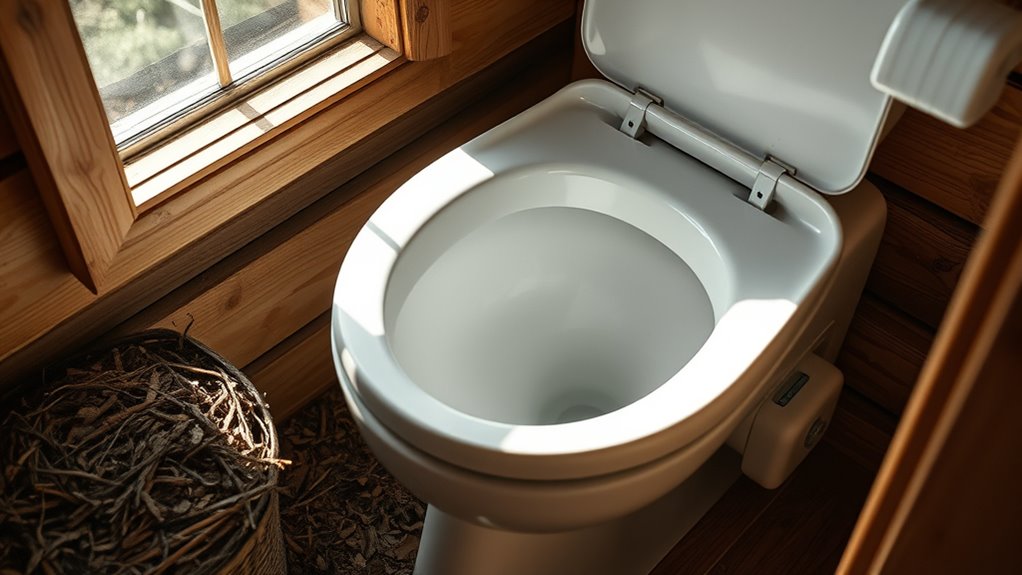Composting toilets work by converting human waste into safe compost through biological decomposition, eliminating the need for water-based flushing. They use materials like sawdust to cover waste, control odors, and promote breakdown, while ventilation systems remove moisture and odors. Consider a composting toilet if you’re looking to save water, reduce sewage costs, or have limited access to traditional plumbing. Stay with us to learn more about how these eco-friendly systems can fit your needs.
Key Takeaways
- Composting toilets convert human waste into safe, nutrient-rich compost through biological decomposition, eliminating the need for water-based flushing.
- They operate using organic cover materials like sawdust to control odors and promote efficient waste breakdown.
- Proper ventilation systems, often solar-powered, are essential for odor control and moisture management inside the unit.
- Ideal for off-grid, eco-friendly, or environmentally conscious settings where traditional plumbing is impractical or undesirable.
- Regular maintenance involves adding cover materials and emptying composted material, making them a sustainable waste management solution.

Composting toilets offer an eco-friendly alternative to traditional plumbing, allowing you to manage waste sustainably without relying on water or sewer systems. These systems are designed to minimize environmental impact by reducing water consumption and transforming waste into usable compost. When considering a composting toilet, eco-friendly design principles are central, ensuring that the unit operates efficiently while blending seamlessly into your environment. Instead of water-based flushing, you use natural processes, making it an attractive option for off-grid living, RVs, cabins, or eco-conscious homes.
At the core of composting toilets are effective waste management strategies. You usually add organic materials like sawdust, coconut coir, or composting additives to cover waste, which helps control odors and accelerates decomposition. The design often includes a separation of liquids and solids, which improves the composting process and prevents unpleasant smells. Ventilation systems are essential, as they remove moisture and odors, maintaining a fresh environment inside the unit. Some models are equipped with fans powered by solar energy, aligning with eco-friendly principles and reducing energy consumption.
Using a composting toilet requires understanding how waste is processed. The solid waste gradually breaks down into compost, which can be safely removed and used for non-food plants once fully composted. This process not only reduces the volume of waste but also produces nutrient-rich material that benefits your garden, closing the loop in sustainable waste management strategies. Liquid waste is often diverted into a separate container or drained into a composting system designed for liquids, further simplifying maintenance and odor control.
Additionally, understanding the role of biological decomposition in composting toilets helps optimize the process and ensures safe, effective waste conversion. Choosing a composting toilet can be especially beneficial if you want to lessen your environmental footprint. They eliminate the need for water, reduce sewage costs, and decrease reliance on extensive plumbing infrastructure. Their eco-friendly design also means they are often made from sustainable or recycled materials, emphasizing environmental responsibility. Maintenance is straightforward but requires regular attention—adding composting materials, emptying the container when full, and ensuring ventilation works properly.
Frequently Asked Questions
Are Composting Toilets Suitable for Large Families?
You might wonder if composting toilets suit large families. They can be a good choice, especially with their eco-friendly design and water conservation benefits. Since they handle waste without relying on water, they reduce water use markedly, making them practical for big households. Keep in mind, proper maintenance and space are essential. If your family is organized and committed, composting toilets can efficiently meet your sanitation needs while supporting sustainability.
How Much Maintenance Do Composting Toilets Require?
You’re probably wondering about maintenance frequency and odor control, right? Well, composting toilets require just a bit of regular attention—think once a week for mixing and adding bulking material. With proper ventilation and occasional emptying, odor stays at bay. So, if you’re ready to embrace a slightly unconventional routine, you’ll find maintenance manageable and odor control quite effective. It’s not rocket science—just a small, eco-friendly commitment.
Can Composting Toilets Be Used in Cold Climates?
You can use composting toilets in cold climates, but winter operation requires extra planning. Insulation considerations become essential to prevent the compost from freezing, which halts decomposition. You might need to add insulation or heat sources to keep the system functioning properly during winter. Regular maintenance and monitoring ensure your composting toilet operates smoothly year-round, even in chilly conditions.
What Is the Lifespan of a Typical Composting Toilet?
Think of a composting toilet like a sturdy bridge; its lifespan depends on the materials and maintenance. Typically, you’ll get 10-20 years from a well-made unit. The biodegradation process gradually breaks down waste, but material durability determines how long the structure remains functional. Regular upkeep and choosing quality materials can extend its life, ensuring you get the most out of your investment.
Do Composting Toilets Emit Any Odors?
You might wonder if composting toilets emit odors. With proper odor control, they generally don’t. Ventilation systems play a key role by removing unpleasant smells and maintaining airflow. Regular maintenance, such as adding bulking agents or turning the compost, also helps keep odors at bay. When these systems are properly installed and maintained, composting toilets can operate odor-free, making them a discreet, eco-friendly choice for your space.
Conclusion
Thinking about a composting toilet might feel a bit unconventional, but it’s a smart way to embrace eco-friendly living without sacrificing comfort. With a little care, you can turn what’s typically hidden away into a natural, sustainable process. It’s an invitation to simplify and connect with nature in a more mindful way. So, consider giving it a try—you might find it’s a surprisingly rewarding step toward greener, cleaner days ahead.









